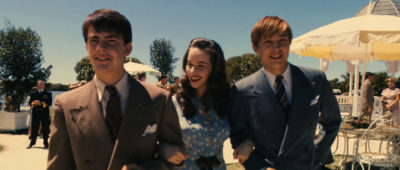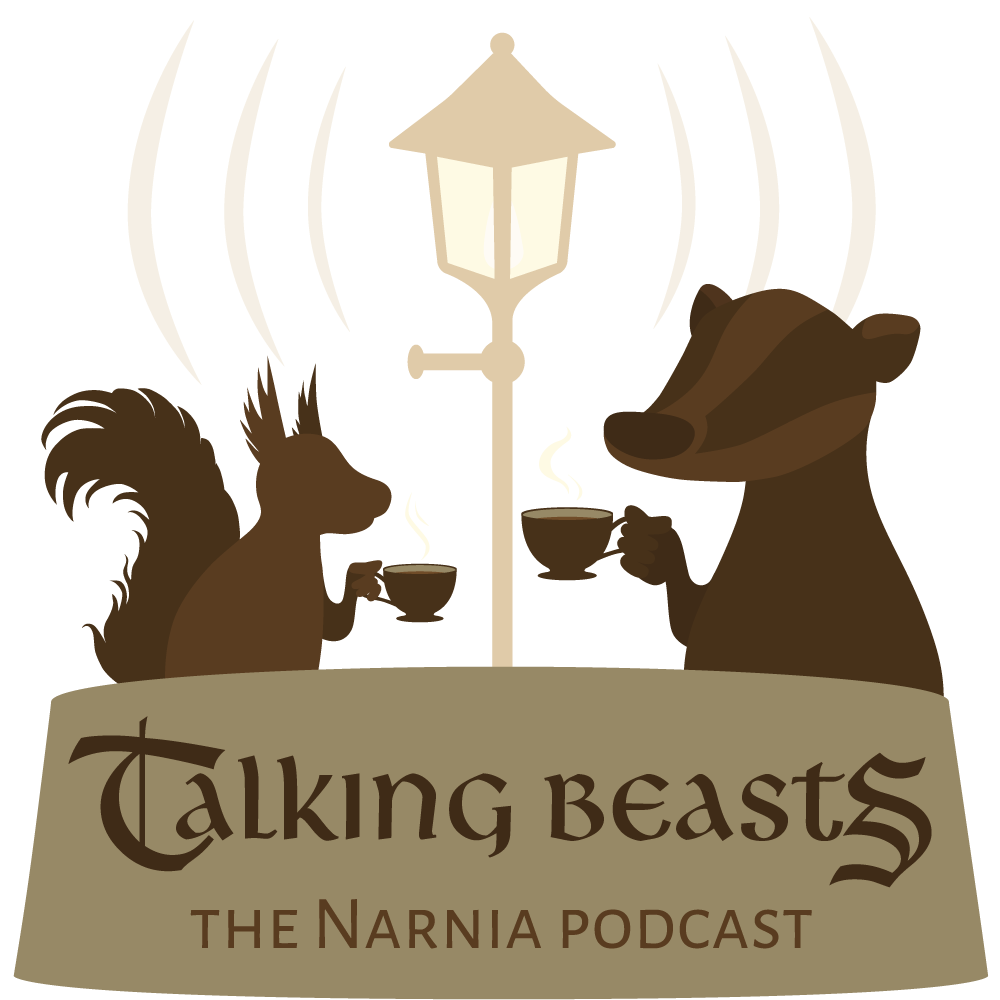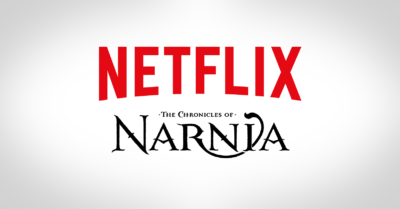Episode 78: ‘Dawn Treader’ Film Analysis, Part 5
Running time: 42:55
 Once again, the NarniaWeb Council must try to survive without its host, Rilian! GlumPuddle and Dr. Elwin Ransom discuss the storm, Lucy’s dream (as Susan) and conversation with Aslan, Goldwater, and Eustace being dragoned.
Once again, the NarniaWeb Council must try to survive without its host, Rilian! GlumPuddle and Dr. Elwin Ransom discuss the storm, Lucy’s dream (as Susan) and conversation with Aslan, Goldwater, and Eustace being dragoned.
Podcast: Play in new window | Embed






I can't hear it.
Hehe, love the ending. "You see, Lucy; you've really had a wonderful life."
But seriously, I have to agree with every thing you guys said…
Great podcast. Agreed with everything too, especially Dr. Ransom's comments about why they should have left the beach scene in where Eustace reveals himself. A great building up of suspense would have done this film more good. Plus it was such a humorous scene in the book too!
Lol what was that thing at the end, after the music…. "You see, Lucy, you've really lived a wonderful life"
I apologize if that's from one of the BBC movies or something… I've only seen the BBC LWW
It's from the movie classic "It's a Wonderful Life", with Lucy's name inserted. It's referring to the obviously Wonderful Life-inspired scene where Lucy sees a world without herself.
ok, now i can. very intelligent discussion, thank you.
basically the movie had no sense of suspense or character development, it was just a series of bam! in and out of shallow situations that were so quick i had no time to get emotionally involved. upon a second viewing 8 weeks later, i enjoyed it more as i had time to absorb the fleeting images and to peice the plot together. it was less of a blur and more enjoyable. 2nd time out i was more forgiving, just taking it for a fun ride. wish it was an hour longer, AA directing, more ballsy , regal music from HGW. it would have really helped. think that team needed to do this last movie, THEN pass it on to fresh blood. hope AA really does come back fo r MN. hey then maybe HGW will be back too!!! wo woo! we'll be back on track!
It's funny… they could have left out the Green Mist and stuck with the original plot and it still would have been a better movie if they'd given us time to attach ourselves to the characters (it's supposed to be character-driven, after all. This isn't supposed to be a war movie).
I liked the scene where Lucy turns into Susan, the transformation was flawless and it was a cool effect to walk into a dreamsequence through the mirror. It also had a good lesson for teenage girls that being happy with who you are and how you look is more important than always comparing yourself with photomodels or other girls.
As for the 'I am Eustace' inscription, i though it was a little easter egg/reference to Burnt Island.
The reason why Caspian and Edmund wheren't turned into dragons was that they weren't tempted by the dragon. They didn't have dragonish thoughts or filled their pockets with gold.
Of course i meant tempted by the treasure instead of dragon. Typo. Nice discussion by the way, good opinons and every detail is well explained.
studios of today assume that all of us are knuckleheads. WATCH EXPLOSIONS! WATCH RAUNCHY SCENES! WATCH HEADBASHING! now, lets think up half a plot to string between these events!
I agree the transformation itself was a good effect.
Ransom suggested (jokingly I think) that "I AM EUSTACE" was a reference to "UNDER ME" in SC.
I thinks that the part in the movie where Aslan tells Lucy to be nothing other that herself is a good lesson for those who try to be someone other than themselves. God love you for the way you are and know one has a more stronger love than Him. I don't know if this makes any sense to you but if it does would you please comment. Thanks
Excellent podcast, as usual! I agreed with most of your comments. I only saw the film once, but I thought I saw a puff of smoke behind Eustace when he was picking up the treasure, and I thought that might actually be a subtle (SHOCK!) reference to the old, dying dragon.
Serenia, you are right. In the background we can hear the old dragon. One of the few subtle parts of the movie.
Great podcast. I mostly agree with your comments. I especially like the comments about the movie making the evil external, and the poor characters came under the green mist ;-). I really liked this movie, but it is not really a Narnia movie. The intent of the book was drastically changed. This is the worst part of the movie. Eustace and Reepicheep are basically the same as in the book. Lucy, Caspian and Edmund are very different from the book. My main impression of the movie is that it was written for a demographic. In this part of the movie Lucy the Valiant is not very valiant. In the Narrowhaven scene you talked about Caspian being robbed of his moment. Here Lucy was robbed before the beauty scene.
I am especially annoyed by the production flaw where Reep goes up the mast after the dragon right-handed and gets the top left-handed, everything reversed. They flipped the film. I am guessing that one house did Reep, and another house did the dragon, and the movie had to fudge.
I liked the Lucy and Susan beauty scene. Very nicely done. The problem with the scene was that the characters were not the same characters as the book. Georgie Henley does some good acting here. It was fun to watch her do her stuff. Good movie; poor adaptation.
The studios really underestimate the intelligence of the audience when they have low quality production such as this.
Dr. Ransom and I had the same thought LOL! Eustace pulling the ship by his tail was so kiddie too I was rolling my eyes during that scene.
I was also fooled by that puff of smoke….I thought it was going to lead into some lengthy dragon's cave sequence, would have been cool to build up the suspense before the dragoning! Eustace and Reep were basically the same but they weren't fleshed out enough.
I LOVE NARNIA: "I thinks that the part in the movie where Aslan tells Lucy to be nothing other that herself is a good lesson for those who try to be someone other than themselves."
I guess I'd just ask where all those people are! 🙂 I'm sure many folks like that are out there, but more often than that problem I see the exact opposite problem: "I'm me; I'm unique, I'm special, and no one should tell me otherwise or suggest I should be different in any way!"
"God love you for the way you are and know one has a more stronger love than Him. I don’t know if this makes any sense to you but if it does would you please comment."
Very glad to offer some help. Did you listen to what GlumPuddle and I had to say about why we didn't like this part? Our objections came mainly in two parts:
1) As GlumPuddle said, movie-Aslan's sermon is just cheesy. It's a very "safe" moral to include, partly because few people would say out loud "you shouldn't be yourself; be someone else." This type of "lesson" could have come from any other cheap fantasy film. It felt tacked-on and lazy.
2) As I pointed out, many viewers who also enjoy the "Voyage" book can tell this doesn't sound like Aslan. But they may not know why. Here's why, I think: because Aslan does not go around telling the children how great they are. In fact, he magically draws them *out* of their world, away from who they were, and makes them into kings, queens and heroes, to tell his own amazing story!
Without Aslan, they would be nothing. So to hear a version of Aslan saying the exact opposite — such as "you discovered Narnia first," as if that makes Lucy great and Aslan's magic had nothing to do with it! — is jarring.
That alone seems to show how poorly the movie's scripwriters understood the book, and the character of Aslan and why he does what he does. (Or they saw it, and changed it intentionally.)
And for the Christian, the change is even more problematic. Might I ask you to compare a thought like "God loves you for the way you are" with the Biblical truth that all people, apart from Christ, are sinners, because they hate God and want His gifts but not Himself? God does not like that at all, but because He is love, He provides a way of escape: His own Son died on the cross, like Aslan on the Stone Table, and took God's punishment for sin. That's how Christ can make His people — not to be "more themselves" or modern moralism like that — but more like *Him*. And that is far better, and a more amazing story, than "be yourself"!
But again, the movie writers didn't need to know that to show Aslan in a way closer to the books' portrayal of the "real" Aslan. They didn't need to have a Bible and the "Voyage of the Dawn Treader" book and make sure they followed everything in *both* books. They only needed the "Dawn Treader" book. But, sadly, they didn't follow that well and all. And it made the story weak.
E. Stephen Burnett ("Dr Elwin Ransom"): Thanks, I guess I was trying to make that point, but just didn't put enough words into it. Thank you for helping me understand and explain that part!!!Be more like Him!!
I love listening to your podcasts. 🙂 I thought the problem with the dragon scene was that Euctace suddenly came up with the idea to use fire to give them the message, but in the book he was still new to everything that they didn't have time to do it in the film, or as they seemed to think.
LOLOLOL Doc's comment at the end XD yup Lucy you really have!
im ok wih the production values, it's the script that is the problem.
i never even noticed that in the 2 times ive seen it.
it's an "UPDATED" adaptation, in their minds.
hi glumpuddle you should connect your videos to jesus 🙂
Great podcast guys, I'm beginning to think that GlumPuddle, Rilian, Gymfan, Warrior, Dr Elwin Ransom and all other podcasters I've probably forgotten who have been doing the film analysis should just make a movie themselves. The point you kept coming back to in the podcast- which I completely agree with- is that the filmmakers really didn't understand the book, and what its themes were. You guys do, so if I ever make a few hundred million dollars, I'm buying the Narnian film rights and hiring you guys to make them!
I actually couldn't put my finger on what was so off about the temptation theme after seeing the movie, I just knew something wasn't right about it, but after listening to this podcast you've showed me what it was: unnaccountability. The movie portrayed the temptation as being some external force, which made it not the characters' fault. Throughout the whole chronicles, Lewis makes it very clear that the characters' biggest enemies are themselves. I'm still trying to get my head around the temptation theme in general… why did they put it in the movie again? Oh yeah, that's right, because it was part of the book C.S. Lewis never wrote. Well, what about the book he *did* write? You know, the one they're MAKING A MOVIE OF??? *facepalm*
And having Lucy save Edmund and Caspian from their fight rather than Aslan? *double facepalm*
As for Lucy's temptation scene, I got really confused in what was dream and what was reality. Loved the Inception reference, but I understood that movie a lot better than this scene, I think! My personal grudge against this scene was that even though she said the spell in a dream, she said it nonetheless. Dreaming about what would happen rather than having something actually happening took away all the seriousness of saying a spell in the first place. I don't know if this is making any sense, but it was like Aslan was letting Lucy turn back time and make another choice. In Prince Caspian, Aslan told Lucy, "We can never know what would have happened." Right. So Aslan is contradicting himself. It's one thing not to understand a book you're making into a movie, but it's another thing not to understand the movie you made only a few years ago!
I completely agree with what you guys were saying about playing down Aslan's sovereignty in his speech, by telling Lucy she's so great. I hated it, it completely went against the whole message of Narnia, which is that we can't do anything without the help of Aslan (or his equivalent in this world). I would have liked it a lot more if he had said something along the lines of, "Lucy, you were my chosen vessel to lead you and your siblings into Narnia, and you don't have to look like Susan to fulfil the plan I have for you." At least that would be acknowledging that it wasn't Lucy that discovered Narnia, but Aslan that called her there.
Sorry for the long post, what I'm basically saying is that I loved your podcast and agreed with pretty much all of it. Keep up the good work!
(By the way, I know pretty much everyone has said this already, but I loved the part at the end- "Yes, Lucy, you really have had a wonderful life." Hilarious!
i read an article from 2001 saying they planned to make a narnia series that was more secularized, to get it out of the christian subculture. it seems they have to shuffle meanings and motivations around a bit for it all to make sense to a secular audience. so don't expect heavy christian messages from any of the future movies, either.
One can always /hope/ for filmmakers who aren't afraid to take risks (including Christian themes despite secular audiences) that will make a good film franchise into an unforgettable one. One can at least hope for filmmakers who aren't wimps…
i think the only hardcore christian involved is gresham, who has to fight to get the most basic christian messages from being dropped.
That is sad. LWW worked well and didn't get secularized to me.
http://www.narniaweb.com/2008/04/april-fools-tilda-swinton-to-appear-in-vdt/ -> in reference to the Witch in VDT 😉 Beware peoples!!!! Beware!!!!
Since you invited debate, I'd like to point out that it could be interpreted that the green mist is reactive, not proactive. Is the green mist really tempting them? Or are their evil desires being materialized into this green mist? Like you, I personally think that the green mist is proactive, but I did want to show another possibility.
On another point, in the podcast it was put forth that there was no correlation between the green mist in Narnia and anything in our world. It seemed like you were saying that in our world, people tempt themselves. While I'd agree that we often let ourselves be tempted, and that we are at fault for giving in to temptation, I still believe that temptation does come from without. In fact, I'm surprised that you don't believe this as well. Have you never read The Screwtape Letters? In fact, the green mist reminds me of 1 Peter 5:8. I wouldn't say there is a one-to-one correlation between the green mist and the devil, (because there are few one-to-one correlations within the chronicles) but I will say that the characters' resistance to the green mist serves as an object lesson for how we are to resist the devil.
While you are right, we must remember that we are never tempted more than we can truly bear. We can't say "the devil made me do it" or "Wormwood made me do it". WE did it, whether or not the temptation came from without. The Green Mist, however, seems to have the power to make people do things. It has power over the Narnians (it can become their fears incarnate and attack them physically, while the Devil has no no true power over Christians). He can attack us, but he can't kill us or force us to do anything.
I don't think there is any lesson for resisting the Devil in VDT. Think for a minute: how did they destroy the Mist? They had to collect a bunch of swords and pile them up on a table. Can we destroy Satan? No. There is only one who can truly vanquish him, and it isn't us.
In the book, Aslan destroyed the Dark Island. In the movie, it was the Narnians. Let's look at the past movies: Aslan defeats the Witch. Aslan wakes the trees and the river-god, essentially causing the Telmarines' defeat. He didn't do much of anything in this movie at all; he gave Lucy a talking-to about believing in herself, and he sends them all home after telling Reep that his home "is for noble hearts".
I've seen the film several times and there is nothing in the film that suggests that the green mist can MAKE anyone do anything. It influences perhaps, but does not make.
I didn't say there was an object lesson in VDT for destroying the devil, I said there was an object lesson in VDT for resisting the devil. Lucy sets fire to the spell to make her beautiful. Edmund throws away his golden shell and turns his back on the goldwater pool. Eustace gives in to his greed and suffers for it, but finds forgiveness and redemption through Aslan. These could be used as excellent examples of resisting temptation. Think about the consequences, and Who it is you are trying to honor, and you can overcome temptation.